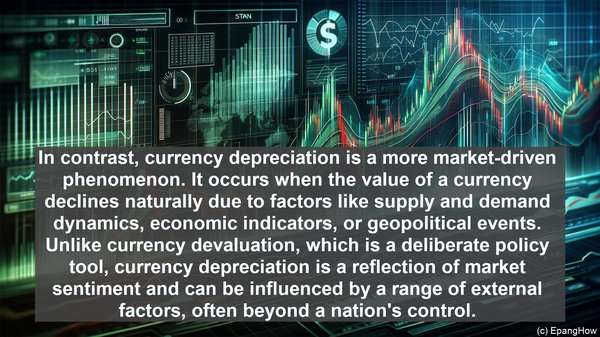Introduction: The Intricacies of Currency Valuation
Greetings, fellow enthusiasts of international finance! Today, we embark on a journey to unravel the intricacies of currency valuation. Specifically, we’ll be dissecting the differences between currency devaluation and currency depreciation. While these terms may seem synonymous, they possess subtle divergences that can have far-reaching consequences in the realm of global economics.
Defining Currency Devaluation: A Deliberate Act
Currency devaluation refers to a deliberate reduction in the value of a nation’s currency, typically undertaken by its central bank or monetary authority. This action is often a response to economic challenges, such as a persistent trade deficit or an attempt to boost exports. By lowering the value of its currency, a country can make its goods and services more affordable and competitive in the international market, potentially stimulating economic growth.
Unraveling Currency Depreciation: Market Forces at Play
In contrast, currency depreciation is a more market-driven phenomenon. It occurs when the value of a currency declines naturally due to factors like supply and demand dynamics, economic indicators, or geopolitical events. Unlike currency devaluation, which is a deliberate policy tool, currency depreciation is a reflection of market sentiment and can be influenced by a range of external factors, often beyond a nation’s control.

Causes and Effects: Divergent Paths
The causes and effects of currency devaluation and currency depreciation also diverge. Devaluation, as a deliberate policy measure, can have both positive and negative consequences. On one hand, it can enhance a country’s export competitiveness, potentially boosting industries and employment. On the other hand, it can lead to higher import costs, inflationary pressures, and reduced purchasing power for citizens. In contrast, currency depreciation, driven by market forces, can have more unpredictable outcomes, impacting various stakeholders differently.

Implications for the Global Economy: A Ripple Effect
Given the interconnectedness of the global economy, currency devaluation and currency depreciation in one nation can have ripple effects across borders. A significant devaluation, for instance, can trigger a ‘currency war,’ where other countries respond by devaluing their own currencies, potentially leading to a cycle of competitive devaluations. Such scenarios can disrupt trade flows, strain diplomatic relations, and create economic instability on a global scale.
